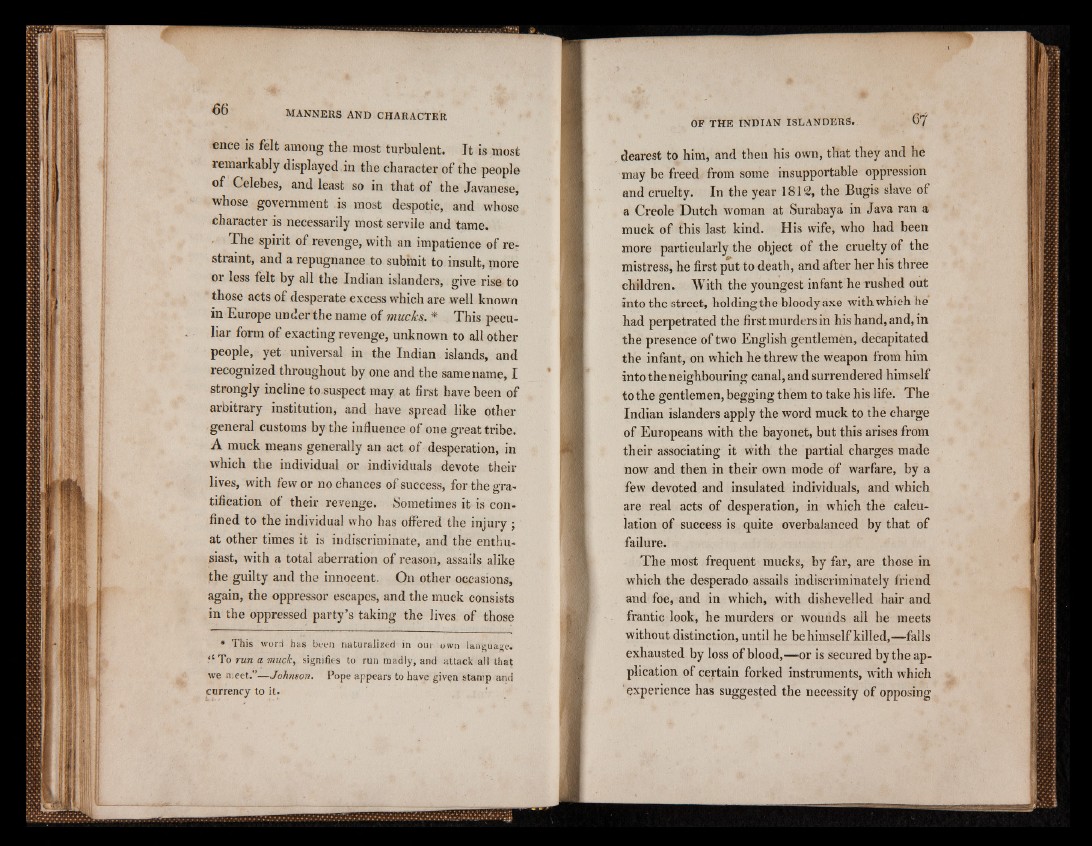
ence is felt among the most turbulent. It is most
remarkably displayed in the character of the people
of Celebes, and least so in that of the Javanese,
whose government is most despotic, and whose
character is necessarily most servile and tame.
The spirit of revenge, with an impatience of restraint,
and a repugnance to submit to insult, more
or less felt by all the Indian islanders, give rise to
those acts of desperate excess which are well known
in Europe under the name of mucks. * This peculiar
form of exacting revenge, unknown to all other
people, yet universal in the Indian islands, and
recognized throughout by one and the same name, I
strongly incline to suspect may at first have been of
arbitrary institution, and have spread like other
general customs by the influence of one great tribe.
A muck means generally an act of desperation, in
which the individual or individuals devote their
lives, with few or no chances of success,7 for the oeratification
of their revenge. Sometimes it is confined
to the individual who has offered the injury ;
at other times it is indiscriminate, and the enthusiast,
with a total aberration of reason, assails alike
the guilty and the innocent. On other occasions,
again, the oppressor escapes, and the muck consists
in the oppressed party’s taking the lives of those
* This word has been naturalized in our own language.
ft To run a muck, signifies to run madly, and attack all that
we meet.”—Johnson. Pope appears to have given stamp and
currency to it.
dearest to him, and then his own, that they and he
may be freed from some insupportable oppression
and cruelty. In the year 1812, the Bugis slave of
a Creole Dutch woman at Surabaya in Java ran a
muck of this last kind. His wife, who had been
more particularly the object of the cruelty of the
mistress, he first put to death, and after her his three
children. With the youngest infant he rushed out
into the street, holdingthe bloodyaxe with which he
had perpetrated the first murders in his hand, and, in
the presence of two English gentlemen, decapitated
the infant, on which he threw the weapon from him
into the neighbouring canal, and surrendered himself
to the gentlemen, begging them to take his life. The
Indian islanders apply the word muck to the charge
of Europeans with the bayonet, but this arises from
their associating it with the partial charges made
now and then in their own mode of warfare, by a
few devoted and insulated individuals, and which
are real acts of desperation, in which the calculation
of success is quite overbalanced by that of
failure.
The most frequent mucks, by far, are those in
which the desperado assails indiscriminately friend
and foe, and in which, with dishevelled hair and
frantic look, he murders or wounds all he meets
without distinction, until he be himself killed,—falls
exhausted by loss of blood,—or is secured by the application
of certain forked instruments, writh which
experience has suggested the necessity of opposing